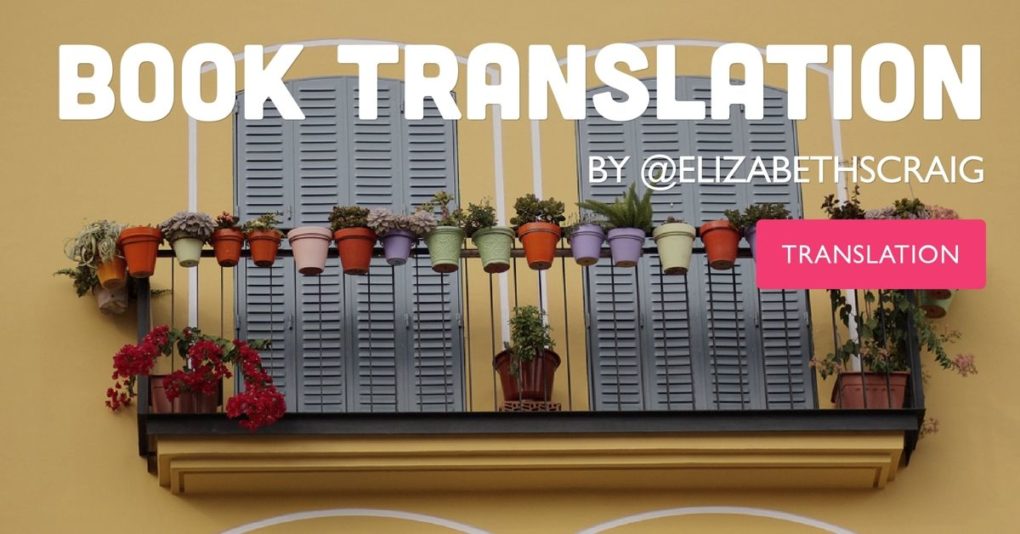by Elizabeth S. Craig, @elizabethscraig
I’ve worked hard to make sure that my books are available internationally. They sell well in Canada, the UK, and Australia, in particular. Not only do I have them available through the Amazon sites in those countries, printed books are available internationally through Ingram. Because Ingram has printers all over the world, shipping costs are a lot more reasonable for international readers than purchasing a printed copy through Amazon.
But why are my books doing well in the previously-mentioned countries, in particular? Because they’re English-speaking countries. Although my books do sell in Europe, Japan, and India, the sales aren’t nearly as strong. This is completely understandable. I know with my college French that I wouldn’t want to tackle a book in French to relax. I want to read in my native tongue.
I first posted my books as available for translation on the site Fiberead, as mentioned in this post. But I haven’t seemed to be able to get any traction there. All I’ve done is sign a bunch of updated terms of service agreements.
I decided a few months ago to put a few of my Myrtle Clover books up on a different translation platform: Babelcube.
I’ll admit to doing this a little reluctantly. I knew that Babelcube, although most likely the largest platform, had a reputation for poor customer service on some indie author forums. But I also knew that I’m familiar with similar platforms: ACX (audiobooks for indie authors) operates much the same way. You audition for talent through their portal (pitching your book in the process), communicate with your audiobook producer through a portal, sign your contract through a portal, agree on deadlines for completion, and review work after certain milestones (first page, first 6 pages, etc.) This is also the way that Babelcube works.
Most significantly similar to ACX (and this will be music to self-published author’s ears), the process is free. You split royalties with your translator (as you’d split them with your narrator on ACX, if you chose a royalty share agreement). My only cost for the project will be an updated, translated, cover. This is worth a royalty split for me. It’s not cost-effective to pay for a translator out of pocket and so my books wouldn’t be translated any other way.
As opposed to Fiberead, I received interest in my series within a few months of signing up. The translator, Freddy Moyano, was experienced, had a solid resume of projects, and lives in the US. A translator’s place of residence can be useful because it may result in fewer culture-related questions from the translator. He’ll be translating several books into Spanish.
Soon after Freddy contacted me, another book received interest and is currently being translated into Portuguese by Fernanda Marchezini Brahemcha.
Taking the samples to a bilingual friend to check the content is a best practice. Spanish was easier to check than Portuguese.
I’ve set a date with my cover designer to incorporate the translated copy.
On my side, the process is very simple and easy. On Freddy’s and Fernanda’s sides, it’s a lot more complex and time-consuming. I’m looking forward to introducing my books to new audiences.
For further reading on both Babelcube and Fiberead, read Keith Dixon’s post on the ALLi blog, “Writing: How Helpful are Free Translation Services for Self-publishing Authors?”
Have you considered translation? Are you using Babelcube?
A closer look at book translation through Babelcube: Share on X
Photo credit: jenny downing via VisualHunt.com / CC BY

That would be cool to have them translated and available for more people to read. One of my books was translated into Turkish which was cool.
I remember hearing that…that’s so cool!
Thanks, Elizabeth, for sharing your experiences. I think the question of translation is a complex one, because it’s not just a question of finding the resources to translate a book. It’s a question of targeting the best market for that book. In other words, you need to be a little selective about which language(s) to start with, etc..
You are absolutely right that it would be nice to make it more of a strategic approach. The problem with that is that sometimes the order of interest from translators doesn’t follow, ha! So I’m heading for the Spanish market before the German market, for instance (although my books are available in Germany…in English…through Tolino (via Draft2Digital).
Is it for print or eBook? Or both? We’ve sold eBooks in few non-English speaking countries, but never to places like Japan or India.
It’ll be available in both print and ebook through Ingram and the usual ebook outlets.
I think the Indian ebook market is just starting to gear up but isn’t going great yet.
I’ve sold regularly (although not spectacularly) in Japan through Amazon (obviously English versions).
Hi Elizabeth – I think it depends on the genre too … ‘murder mayhem’ – sorry not a brilliant description but bearing in mind the books are going overseas – it’s an area that must make sense for a story wherever in the world one is. By breaking into these markets, even if slow, you’ve made the jump and I’m sure they’ll develop. I don’t know if you could do something specifically for the different countries … that would entice more buyers/readers in … Interesting about the Indian ebook market … cheers Hilary
I think it would be great to be more deliberate about the process than the way it usually proceeds. :) It would be great to adapt covers, etc. for overseas. Budget-wise, I’m not going that route, but the translators are making changes to the text (with my blessing) to adapt it to their audience. For instance, the Portuguese translator said I’m very name-heavy and that the Portuguese readers are looking for more pronouns. She’s making that change, among others.